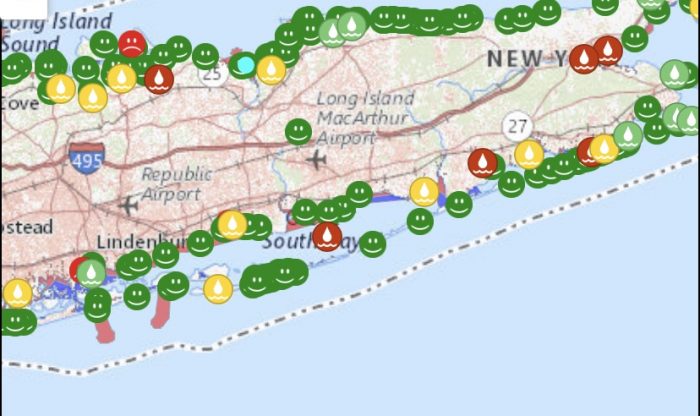Stony Brook University’s Christopher Gobler, endowed chair of Coastal Ecology and Conservation, and Sung-Gheel Jang, faculty director in the Geospatial Center at Stony Brook University, have created a free app that provides information on water quality on Long Island.
Through the downloadable Long Island Beach and Water Quality App, also known as LIBAWQA, residents can gather information that can connect to a person’s location, indicating the health and safety of beaches, bays, estuaries or waterways near them.
Gobler’s lab provides the water quality data, which comes from measures they make in 30 locations from East Hampton to Hempstead.
The New York State Department of Health provides updates on about 200 beaches across the Island, while the NYS Department of Environmental Conservation offers shellfishing data for more than 500,000 acres of bays, harbors and estuaries.
Jang, whose expertise is in the mapping related to geographic information systems, or GIS, helped build a service he targeted for the general public.
Instead of calling the county to find out if their favorite summer destination is open, residents can “use the app and you will know the current water quality,” Jang said.
Shellfishing and bathing restrictions use different criteria to determine the safety of swimming or pulling up clams and other shellfish.
“This is the beauty of the app,” Gobler said. One day last week, he noticed that a site in Center Moriches allowed swimming but not shellfishing. “The beach right next to it” allows shellfishing. “Which one would you rather go to?”
The app, which is available by installing ArcGIS AppStudio Player from Google Play, the App Store or the Microsoft Store and using a QR code on a camera, can show the health history of a beach.
While the system, which Gobler described as being in “version 1.0” doesn’t have text alerts, it does provide real-time information.
Users can track their location on the map in the app, checking on the shellfish or bathing status of nearby waterways.
The idea for this app came about a couple of years ago when Jang visited Gobler’s lab and the two Stony Brook researchers talked about collaborating.
“I was impressed by [Gobler’s] work,” Jang said. “His lab collected water quality data for many, many years.”
Jang suggested creating an easy-to-use mobile app. Gobler wanted to add other information beyond the water quality data his lab collected regularly.
Gobler and Jang expect to modify and enhance the information by next summer, when it could include a crowdsourcing opportunity, in which participants share updated information, including limitations on parking or beach closures.
Gobler and Jang said they would need to provide a filter before posting information to ensure it contains quality data.
The service isn’t available in the Google or Apple app stores yet.
“By next summer we hope we can release a new version,” Jang added. “We wanted to show we have a working app first.”
Scientists of any age, from primary school through postdoctoral researchers, can use the information for their own research papers or studies, Jang said.
Anyone who is interested in accessing and using the data for their own research projects can contact Jang through his email at [email protected].
The scientists have received funding from the Rauch Foundation and The Chicago Community Trust. The pair will seek renewals from both sources this fall.





